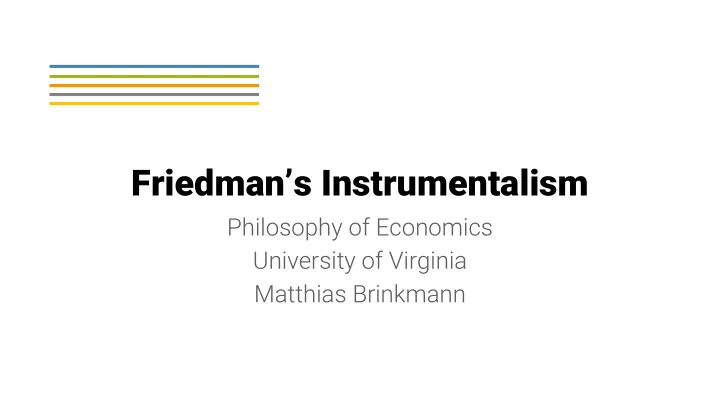

Friedman’s Instrumentalism Philosophy of Economics University of Virginia Matthias Brinkmann
Background Milton Friedman (1912-2006) Nobel price (1976) Founder of monetarism Lasting influence on conservative economists Highly influential essay: “Methodology of Positive Economics” (1953) 2 Friedman's Instrumentalism 29/10/2018
Contents 1. Friedman’s Instrumentalism 2. Friedman’s Examples 3. Popper vs Friedman 4. Do economists follow Friedman’s methodology? Friedman's Instrumentalism 3 29/10/2018
Realists and Instrumentalists (Reiss) Reiss , Julian. “Idealization and the Aims of Economics: Three Cheers for Instrumentalism.” Economics and Philosophy 28, no. 3 (2012): 363 – 83. Friedman's Instrumentalism 4 29/10/2018
The Aims of Economics [The] task [of economics] is to provide a system of generalizations that can be used to make correct predictions about the consequences of any change in circumstances. Its performance is to be judged by the precision, scope, and conformity with experience of the predictions it yields. (p. 146) • Predictive Success is the main aim of an economic theory • Simplicity and Fruitfulness are secondary desirable qualities Friedman's Instrumentalism 5 29/10/2018
The Instrumentalist Claim • There is no issue of the truth of the assumptions over and above predictive success ( instrumentalist thesis ): the relevant question to ask about the “assumptions” of a theory is not whether they are descriptively “realistic” [...] but whether they are sufficiently good approximations for the purpose in hand. And this question can be answered only by seeing whether the theory works, which means whether it yields sufficiently accurate predictions [...]. (p. 153) • But sometimes Friedman seems to say something much more radical ( strong instrumentalist thesis ) Truly important and significant hypotheses will be found to have ‘assumptions’ that are wildly inaccurate descriptive representations of reality, and, in general, the more significant the theory, the more unrealistic the assumptions [...]. (p. 153) Friedman's Instrumentalism 6 29/10/2018
Contents 1. Friedman’s Instrumentalism 2. Friedman’s Examples 3. Popper vs Friedman 4. Do economists follow Friedman’s methodology? Friedman's Instrumentalism 7 29/10/2018
The Law of Falling Bodies • Take the formula for falling bodies, s = ½gt² (p. 154) • This law rests on the “assumption” that bodies fall in a vacuum This is generally not true Still, for a wide range of circumstances, bodies (approximately) fall as if they were in a vacuum So the theory “works” in many circumstances; this is why we accept it (p. 155) Do assumptions in economics work like this? Friedman's Instrumentalism 8 29/10/2018
Leaves and Billiard Players • We can explain left growth in trees as if leaves maximised individual utility (p. 156) Clearly, leaves do not maximise anything, so this assumption is false But this is an elegant and economic way to state a successful theory • The same is true if we say that professional billard players act as if they applied rules of physics • The same is true if we say that individuals act as if they were utility maximisers Friedman's Instrumentalism 9 29/10/2018
Contents 1. Friedman’s Instrumentalism 2. Friedman’s Examples 3. Popper vs Friedman 4. Do economists follow Friedman’s methodology? Friedman's Instrumentalism 10 29/10/2018
Popper on Realism Within [the] rationalist tradition science is valued, admittedly, for its practical achievements; but it is even more highly valued for its informative content, and for its ability to free our minds from old beliefs, old prejudices, and old certainties, and to offer us in their stead new conjectures and daring hypotheses. Science is valued for its liberalizing influence — as one of the greatest of the forces that make for human freedom. (Popper, Conjectures and Refutations ) 11 Friedman's Instrumentalism 29/10/2018
Popper on Instrumentalism But there is another way of looking at these matters. For some, science is still nothing but glorified plumbing, glorified gadget-making- ‘mechanics’; very useful, but a danger to true culture, threatening us with the domination of the near- illiterate ( of Shakespeare’s ‘mechanicals’). It should never be mentioned in the same breath as literature or the arts or philosophy. […] It cannot and does not reveal to us new worlds behind our everyday world of appearance; for the physical world is just surface: it has no depth. (Popper, Conjectures and Refutations ) 12 Friedman's Instrumentalism 29/10/2018
Friedman on Popper As an amusing footnote , one of the major benefits that I personally derived from the first meeting of the Mont Pelerin Society in 1947 was meeting Karl Popper and having an opportunity for some long discussions with him, not on economic policy at all, but on methodology in the social sciences and in the physical sciences. That conversation played a not negligible role in a later essay of mine, "The Methodology of Positive Economics” […]. Interview with Milton Friedman, https://www.minneapolisfed.org/publications/the-region/interview- with-milton-friedman Friedman's Instrumentalism 13 29/10/2018
Contents 1. Friedman’s Instrumentalism 2. Friedman’s Examples 3. Popper vs Friedman 4. Do economists follow Friedman’s methodology? Friedman's Instrumentalism 14 29/10/2018
Questions • What would economics look like if it lived up to instrumentalist standards? Unrealistic model-building is vindicated (to a degree) But: model-building for model- building’s sake is strongly opposed As in Popper, probably much more empirical testing would be required • How do we determine that a model “works”? Comparison to existing models? Community standards? (The community of academic economists?) • Is there no role for understanding in instrumentalism? • If we’re instrumentalists, do we not have pragmatic reasons to care for realistic assumptions? Friedman's Instrumentalism 15 29/10/2018
Further Reading • Hands , Wade. “Did Milton Friedman’s Methodology License the Formalist Revolution?” Journal of Economic Methodology 10, no. 4 (2003): 507 – 20. • Popper, Karl R. Conjectures and Refutations: The Growth of Scientific Knowledge . New York: Harper & Row, 1968 . Chapter 3, “Three Views Concerning Human Knowledge”. • Reiss, Julian. “Idealization and the Aims of Economics: Three Cheers for Instrumentalism.” Economics and Philosophy 28, no. 3 (2012): 363 – 83. • Boland, Lawrence. “A Critique of Friedman’s Critics.” Journal of Economic Literature 17, no. 2 (1979): 503 – 22. Friedman's Instrumentalism 16 29/10/2018
Recommend
More recommend